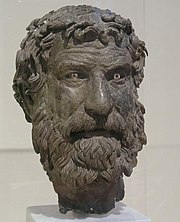Portal:Ancient Egypt/Selected biography/4

Philitas of Cos (c. 340–c. 285 BC) was a scholar and poet during the early Hellenistic period of ancient Egypt. A Greek associated with Alexandria, he flourished in the second half of the 4th century BC and was appointed tutor to the heir to the throne of Ptolemaic Egypt. He was thin and frail; Athenaeus later caricatured him as an academic so consumed by his studies that he wasted away and died.
Philitas was the first major writer who was both a scholar and a poet. His reputation continued for centuries, based on both his pioneering study of words and his verse in elegiac meter. His vocabulary Disorderly Words described the meanings of rare literary words, including those used by Homer. His poetry, notably his elegiac poem Demeter, was highly respected by later ancient poets. However, almost all his work has since been lost. The 1st century AD rhetorician Quintilian ranked Philitas second only to Callimachus among the elegiac poets. Philitas' influence has been found or suspected in a wide range of ancient writing; Longus' 2nd century AD novel Daphnis and Chloe contains a character likely named after him. Hermesianax wrote of "Philitas, singing of nimble Bittis", and Ovid twice calls her "Battis". It is commonly thought that Bittis or Battis was Philitas' mistress, and that Hermesianax referred to love poetry; another possibility is that her name connoted "chatterbox", and that she was a humorous personification of Philitas' passion for words. Almost all that he wrote seems to have disappeared within two centuries, though, so it is unlikely that any writer later than the 2nd century BC read any but a few of his lines.
